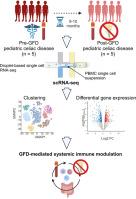短期无麸质饮食对儿童乳糜泻的免疫调节作用:来自单细胞转录组学研究的发现
IF 4.9
2区 医学
Q1 BIOCHEMISTRY & MOLECULAR BIOLOGY
引用次数: 0
摘要
乳糜泻(CD)是一种自身免疫性疾病,具有很强的遗传成分,由摄入麸质引发。虽然无谷蛋白饮食(GFD)是标准的治疗方法,但其对儿童乳糜泻免疫细胞调节的短期影响在很大程度上仍未被探索。本研究旨在利用单细胞RNA测序(scRNA-seq)研究严格GFD治疗9-10个月后儿童CD患者外周血单个核细胞(PBMCs)的转录变化。对5例小儿乳糜泻患者进行了一项观察性纵向研究(通过粪便中谷蛋白免疫原性肽的测定证实)。使用基于液滴的scRNA-seq分析pbmc,以鉴定gfd前和gfd后细胞之间的簇标记物和差异表达基因(DEGs)。19个免疫细胞簇包括各种经典的免疫细胞亚型被确定。主要发现包括在不同的免疫细胞亚群中,GFD后促炎基因下调和免疫调节基因上调。巨噬细胞和单核细胞的变化表明免疫平衡得到改善,而T细胞表现出向效应活性降低的转变。值得注意的是,gfd后调节性T细胞转变为免疫抑制谱增强的轨迹,如HLA-G增加和DDX5表达减少所证明的那样。在儿童乳糜泻患者中,严格的短期GFD诱导了显著的免疫调节,突出了疾病监测的潜在生物标志物。然而,由于样本量小,结果应谨慎解释,需要更大规模的队列研究进一步确认和验证。这些发现为GFD的免疫学机制提供了见解,并为非侵入性诊断策略提供了途径,以加强患者管理。本文章由计算机程序翻译,如有差异,请以英文原文为准。

Immunomodulatory effects of a short-term gluten-free diet on pediatric celiac disease: Findings from a single-cell transcriptomics study
Celiac disease (CD) is an autoimmune disorder with a strong genetic component, triggered by gluten ingestion. Although a Gluten-Free Diet (GFD) is the standard treatment, its short-term effects on immune cell modulation in pediatric CD remain largely unexplored. This study aimed to investigate transcriptional changes in peripheral blood mononuclear cells (PBMCs) of pediatric CD patients following a strict GFD for 9–10 months, using single-cell RNA sequencing (scRNA-seq). An observational longitudinal study was conducted on five pediatric CD patients pre-GFD and post-GFD (confirmed by gluten immunogenic peptide determination in feces). PBMCs were analyzed using droplet-based scRNA-seq to identify cluster markers and differentially expressed genes (DEGs) between pre-GFD and post-GFD cells. Nineteen immune cell clusters encompassing a variety of classical immune cell subtypes were identified. Key findings included the downregulation of pro-inflammatory genes and the upregulation of immune-regulatory genes after a GFD in different immune cell subsets. Changes in macrophages and monocytes suggested improved immune balance, while T cells demonstrated a shift towards reduced effector activity. Notably, post-GFD regulatory T cells transitioned into a trajectory towards enhanced immunosuppressive profiles, as evidenced by increased HLA-G and decreased DDX5 expression. A strict short-term GFD induced significant immune modulation in pediatric CD patients, highlighting potential biomarkers for disease monitoring. Nevertheless, due to the small sample size, results should be interpreted with caution, and larger cohort studies are needed for further confirmation and validation. These findings provide insights into the immunological mechanisms of GFD and suggest avenues for noninvasive diagnostic strategies to enhance patient management.
求助全文
通过发布文献求助,成功后即可免费获取论文全文。
去求助
来源期刊

Journal of Nutritional Biochemistry
医学-生化与分子生物学
CiteScore
9.50
自引率
3.60%
发文量
237
审稿时长
68 days
期刊介绍:
Devoted to advancements in nutritional sciences, The Journal of Nutritional Biochemistry presents experimental nutrition research as it relates to: biochemistry, molecular biology, toxicology, or physiology.
Rigorous reviews by an international editorial board of distinguished scientists ensure publication of the most current and key research being conducted in nutrition at the cellular, animal and human level. In addition to its monthly features of critical reviews and research articles, The Journal of Nutritional Biochemistry also periodically publishes emerging issues, experimental methods, and other types of articles.
 求助内容:
求助内容: 应助结果提醒方式:
应助结果提醒方式:


